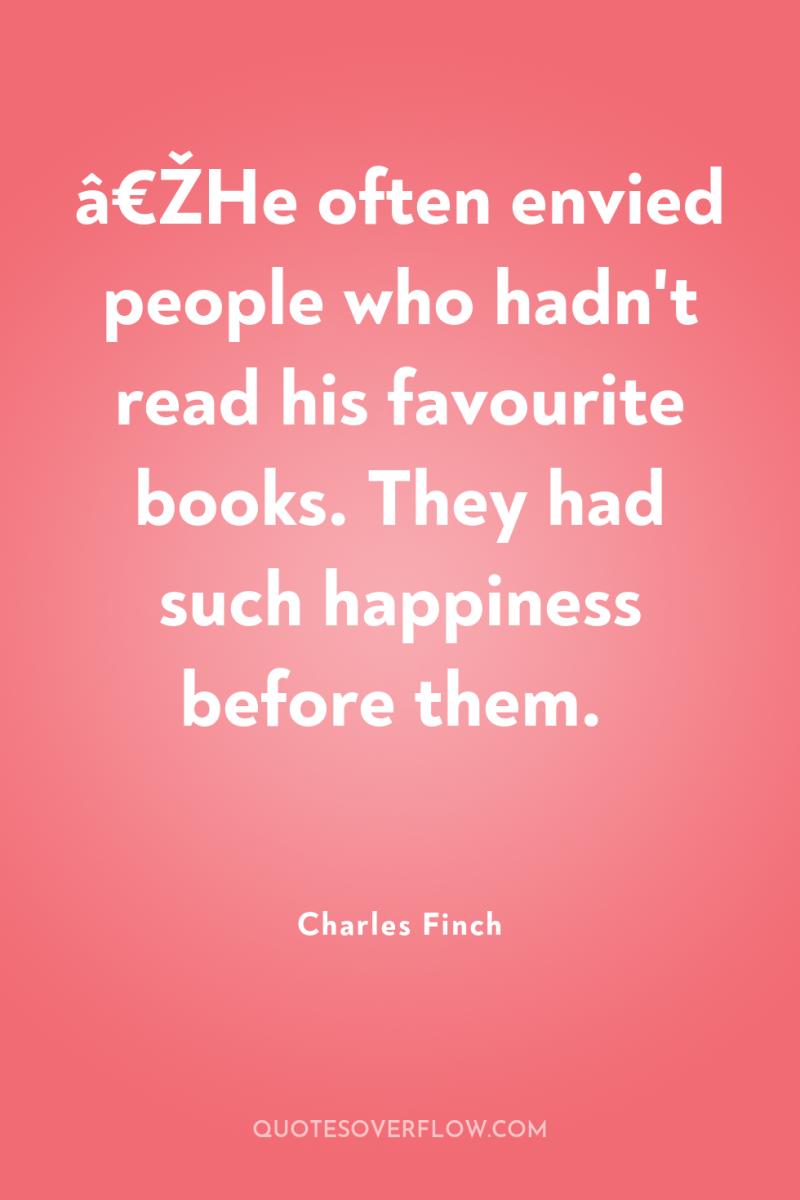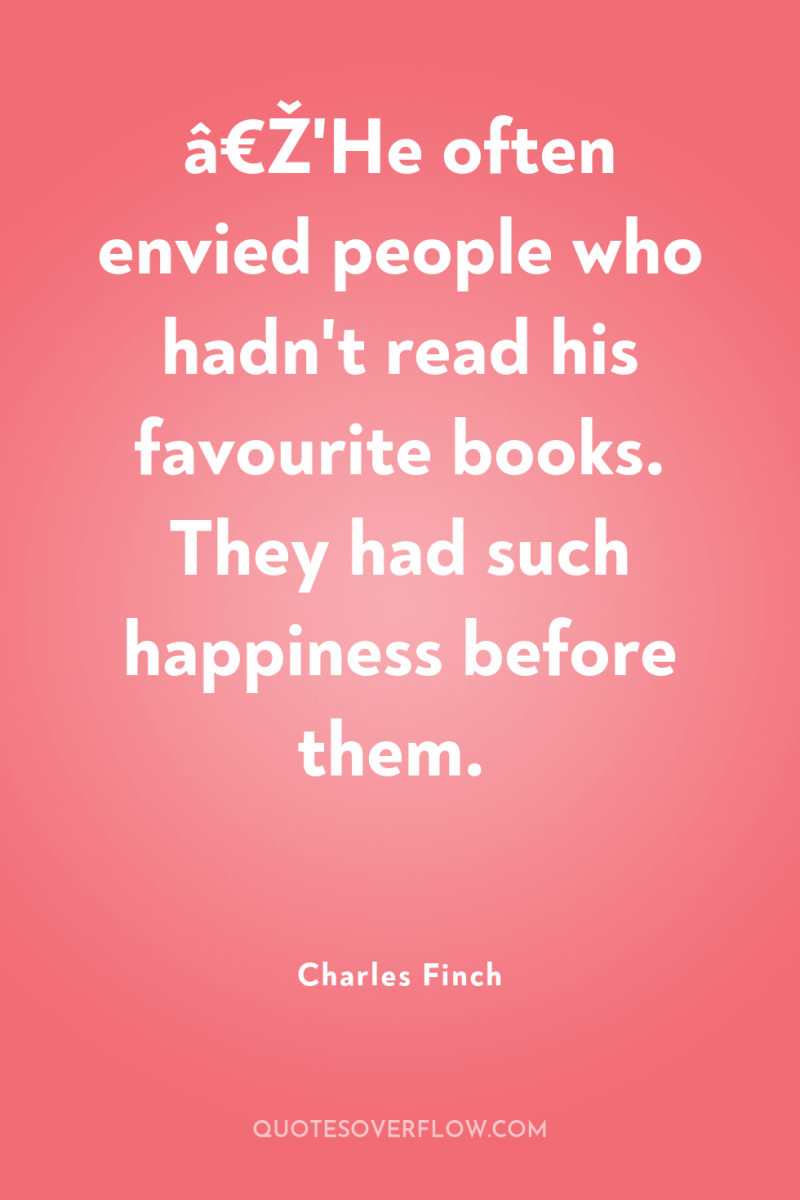
1
‎He often envied people who hadn't read his favourite books. They had such happiness before them.Charles Finch

2
‎'He often envied people who hadn't read his favourite books. They had such happiness before them.Charles Finch
3
Are you going to give a speech?' she asked gaily. He gave a choked laugh. 'Of course not, ' he said. 'Not for ages.'' My cousin Davey gave one on his very first day! ' ..'In the Lords, I remember. It was about how he didn't like strawberry jam.'' Be nice, Charles! It was a speech about fruit importation, which I admit devolved into something of a tirade.' She couldn't help but laugh. 'Still, you could talk about something more important.'' Than jam? Impossible. We mustn't set the bar too high, Jane. .Charles Finch
4
There are a lot of ways for a novelist to create suspense, but also really only two: one a trick, one an art. The trick is to keep a secret. Or many secrets, even. In Lee Child’s books, Jack Reacher always has a big mystery to crack, but there are a series of smaller mysteries in the meantime, too, a new one appearing as soon as the last is resolved. J.â€â€°K. Rowling is another master of this technique – Who gave Harry that Firebolt? How is Rita Skeeter getting her info? The art, meanwhile, the thing that makes “Pride and Prejudice” so superbly suspenseful, more suspenseful than the slickest spy novel, is to write stories in which characters must make decisions. “Breaking Bad” kept a few secrets from its audience, but for the most part it was fantastically adept at forcing Walter and Jesse into choice, into action. The same is true of “Freedom, ” or “My Brilliant Friend, ” or “Anna Karenina, ” all novels that are hard to stop reading even when it seems as if it should be easy.Charles Finch
5
If there’s a single idea I emphasize when people ask about writing, it’s that there’s no right way to produce a book. But I do think that whatever you do, you should do regularly, whether it’s waking up at midnight and drinking vodka or waking up at dawn and drinking tea, whether it’s sitting in a monkish study or writing on the back of a flatbed truck. The analogy I like is children’s literature: in a lot of children’s books, there’s a huge institutional structure (Hogwarts, for example) whose presiding safety allows the children’s imagination to run free. The more consistent your habits are — and this ties into having your tools nailed down — the more secure your brain will be to run free and create. .Charles Finch
6
Of course, that’s one of the dreams of modernist literature, whether realist or fantastic: that the more stories we tell each other about such tragedies, the fewer of them there will be. We’re still waiting for the results.Charles Finch
7
I guess the lesson is you can’t go everywhere. You should still go everywhere you can.Charles Finch
8
The Thames was beautiful, dark, and swift beneath the billion yellow and white lights of the city…Charles Finch
9
Suddenly Dallington burst into speech. 'Listen, Lenox - I want to apologize...' Lenox waved a dismissive hand. 'You're young, ' he said. 'There are many lessons before you, some harder than this one... All too often things are blurry, though, John. It's the way of the world. Humans are blurry creatures,Charles Finch
10
There's nowhere that life feels more eternal, your dimwit youth more important, than Paris.Charles Finch
11
The truth was that I didn't know my own mind. Just as you might move into a house and in the scatterbrained days of unpacking leave a broom in some corner, where it remains until someone uses it and then returns it to that corner, now knowing that it was there by casual chance, until slowly that corner becomes its hallowed place, where you can always find the broom - just as all traditions begin as accidents, how the borders of countries are formed, how we marry, how we make friends and children - so, until Oxford, had I lived, within a sequence of non decisions, and yet with the same misdirected conviction of intentionality with which humans infuse their errors and felicities alike.Charles Finch
12
When you're finally a grown-up, one of the things you find is that there are no grown-ups.Charles Finch
13
Like everyone I slipped into adulthood like a delinquent through the back door.Charles Finch
14
If you look for endings you can always find one, but I truly felt as if I had used up the last of my youth, if youth is that finite stage of life when it all feels expeditionary, inexact.Charles Finch
15
I personally find that having a couple of projects going at once can be an aid to focus, refreshing my brain as I go back and forth between them — a book review and a novel at the same time, for example. But I’ve seen that writers who are starting out sometimes throw their energy in so many different directions that they can never finish any of the projects, much less all of them. To me a good test is this: what do you like to read? What kind of book moves and affects you the most? Is it the memoir, the novel, the long poem-collection? Personally, I find myself most immersed in the novel, and that’s why I write them — they have the most magic for me. The joy of self-expression is exhilarating, but ultimately choosing one venue for it can make your work much better — and same for your chances of actually finishing something. .Charles Finch
16
To me, the single biggest mark of the amateur writer is a sense of hurry. Hurry to finish a manuscript, hurry to edit it, hurry to publish it. It’s definitely possible to write a book in a month, leave it unedited, and watch it go off into the world and be declared a masterpiece. It happens every fifty years or so. For the rest of us, the single greatest ally we have is time. There’s no page of prose in existence that its author can’t improve after it’s been in a drawer for a week. The same is true on the macro level — every time I finish a story or a book, I try to put it away and forget it for as long as I can. When I return, its problems are often so obvious and easy to fix that I’m amazed I ever struggled with them. Amateur writers are usually desperate to be published, as soon as possible. And I understand that feeling — you just want it to start, your career, your next book, whatever. But I wonder how many self-published novels might have had a chance at getting bought, and finding more readers, if their authors had a bit more patience with them? .Charles Finch
17
The river was glossy, narrow, and quick, a beautiful green color, with the white and maroon striped college punts strung along the near bank... The sun, westering, heavy, and hazy, was in those great final throes of energy before the sky whitens and clears, and evening comes. I stood and watched it. That immense body, dying trillions of feet away from me, still warming my face with its steady insensate chemistries. .Charles Finch
18
The Bodleian above anything else made Oxford what it was . There was something incommunicably grand about it, something difficult to understand unless you had spent your evenings there or walked past it on the way to celebrate the boat race, a magic that came from ignoring it a thousand times a day and then noticing its overwhelming beauty when you came out of a tiny alley and it caught you unexpectedly. A library--it didn't sound like much, but it was what made Oxford itself. The greatest library in the world.Charles Finch